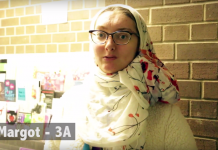On Jan. 21, the University of Waterloo community received an email from the president and vice-president of UW, announcing that most in-person teaching and learning is now scheduled to resume on Feb. 7. The decision was partially attributed to high vaccination rates on campus, with over 99 per cent of those regularly on campus having received at least two doses of a COVID-19 vaccine.
The email stated that due to the government of Ontario’s recent announcement to “cautiously and gradually ease public health measures,” the university would continue to transition to fully in-person learning experiences, with the Ministry of Colleges and Universities confirming that there are “no restrictions on in-person instruction on our campuses.” However, the email did go on to say that “to further reduce risks we have decided that some large lectures will continue to take place online until after reading week.”
Recreational facilities and dining areas will reopen on Jan. 31 at 50 per cent capacity. Study spaces will also be open with limitations to allow for compliance with social distancing measures. Some large lectures will continue to be delivered online until Feb. 28; students and TAs can expect to hear more details from their respective faculties.
The return to mostly in-person learning is the latest update in a series of decisions that were made in an attempt to reduce the impact of Omicron. However, the university’s transition to mostly in-person activity is also indicative of a growing trend amongst post-secondary institutions — the individualization of reopening plans.
On Jan. 19, 2022, Wilfrid Laurier University (WLU) released a memo stating that in-person learning for the winter term would return via a “four-phased approach,” which would take place between Jan. 31 and Feb. 28. Conestoga College also announced, on Dec. 17, 2021, that learning would take place online from Jan. 3 to Jan. 30, with the university’s reopening planned for Jan. 31. The mixed timelines have raised equally mixed opinions amongst students belonging to the different institutions.
Mandy Zeng, a first-year studying economics with management at WLU, advocated for extending online learning, stating, “I think it’s better to just stick with online if people wanna avoid having another wave [of COVID-19]… I think [the four-phase plan] is the most they can do, but I realize the reality is it’s inevitable that the more people you let in school, the more cases there are going to be.” She continued on to point out, “Right now it’s only the first phase with classes that are smaller… but 100 is still a big number and we’re talking about many classes, lots of people, so no matter how much you try there’s always gonna be a new wave.”
Tom Garavellos, a first-year in UW’s honours arts and business program, took a different approach. Regarding UW’s plan to reopen on Feb. 7, he stated, “I think it’s long overdue. Not many people can cope with an online environment… I know I haven’t done any proper schoolwork for the last month.”
When asked his thoughts on the different timelines, he said, “I think it makes more sense for us to open at the time that we are, in contrast to other schools, because there’s going to be less students going out socializing, to class, etc, so if we have [Omicron] it’s going to stay in our school, but if we’re mingling with other students then we’re going to spread the virus in the city.”
Emails from the three post-secondary institutions reassured students that each school continued to actively monitor the situation, with Conestoga, in particular, stating that “This modification to our plans… will provide time for employees and students to receive the vaccine booster doses… while also reducing the social contact that contributes to community spread of COVID-19.”
This emphasis on tracking community spread and vaccination rates on campuses, as seen in the UW and Conestoga emails, seems to bear the brunt of justifying a reopening date. However, the varied timelines have still served as a reason to worry for some.
Dominic Pham, a third-year at Conestoga’s bachelor of computer science program, brought up the fact that “[Protocol changes] are kinda last minute sometimes… sometimes it’s not enough time for, say, international students who worry about housing as well.” However, he did praise Conestoga’s efforts to ensure the safety of their students, saying, “They are putting up a lot of precautions… safety-wise, they’re trying their best. They’re distributing masks so we can’t use our own, they just give a standard one for everyone on campus to use.”
Though international students who are considered fully vaccinated may be exempt from some quarantine measures, all travellers arriving in Canada must prepare to quarantine depending on the advice they are given at the border.
Zeng also touched upon a key factor for many students in the region, that being Chinese New Year. “The timing of [WLU’s reopening] is another thing because a lot of people want to stay home [for Chinese New Year], but because they’re reopening school at that time a lot of people will not be spending it with their family.” Chinese New Year 2022 begins on Feb. 1, the second day of WLU’s four-phase plan.
The fluctuations in reopening plans have also caused student frustration in schools outside of the KW region such as the University of Western Ontario (UWO), which delayed returns to in-person learning until Jan. 31 for upper-years and Feb. 28 for first-years, leading to two competing petitions to reverse and extend the online learning period, respectively.
Tanisha Juneja, a first-year in UWO’s bachelor of management and organizational studies program, questioned what she perceived to be an arbitrary arbitrary reopening date and justification from the university. “I don’t like the fact that it’s so late into the semester because by February 28 our first round of midterms is almost over… there’s just not enough time to set up a schedule for yourself and then also study for exams,” she said. She also pointed out that despite the extended online learning, “There’s no difference in tuition. Your money goes down the drain, your mental health goes down the drain and for some people their grades go down the drain.”
When told WLU’s and UW’s opening dates, Juneja further questioned the reasoning behind UWO’s unique reopening date for first-years. “‘We have to clean residences?’ What were [UWO] doing in January? What was Laurier doing that they can open in January and we can’t? … The only distinction [UWO] is making is that first-years live on campus, but is it really that different to have two people share a dorm as opposed to, for example, two upper years having their own rooms but sharing a kitchen?”
It’s clear to see that though reopening timelines may fluctuate due to COVID, there are plenty of aspects that can be unintentionally impacted due to the unstable timelines. As the mixed reactions show, universities’ reopening timelines do not just stem from and impact pandemic-related issues, but a much broader group of issues that are often buried in the wake of the pandemic.






























